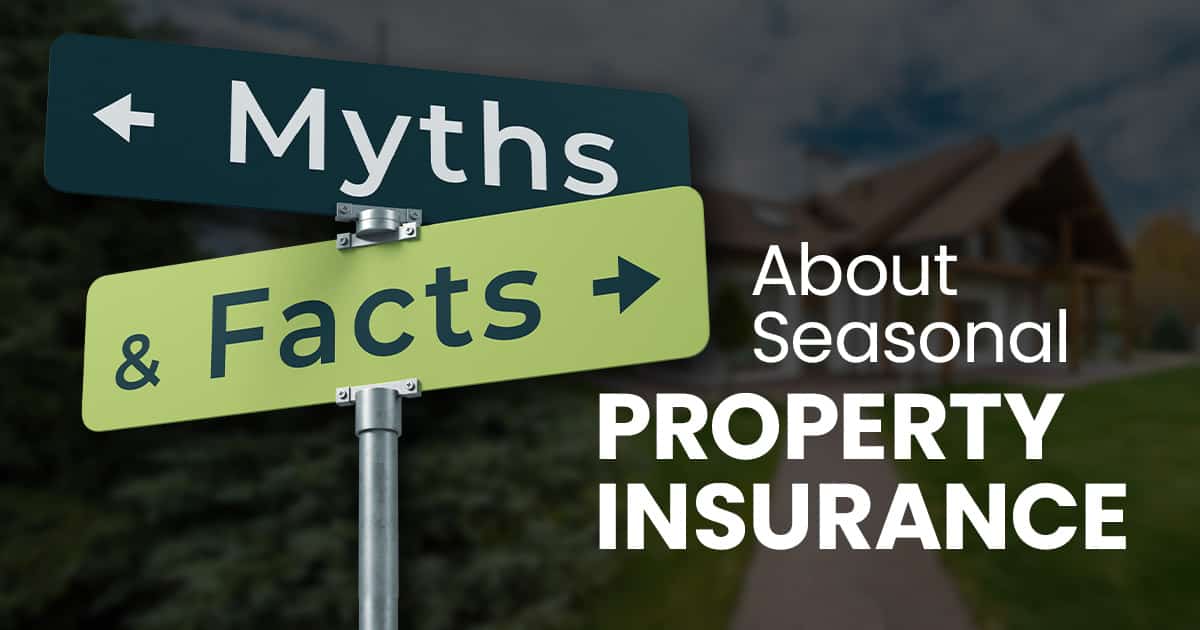
Myths & Facts About Seasonal Property Insurance
June 8, 2024
Share:
What’s the real difference between a cottage or seasonal property and a home, anyway? Why should they have separate titles for their insurance, when they’re – well, virtually the same thing? Seasonal homes and primary residences boast a lot of similarities, but they are not the same. Seasonal dwellings, as a first point, are not occupied year-round the way a primary residence might be. From an insurance perspective, this already puts them into a totally different risk pool.
Additionally, cottages and seasonal properties may be of lower value and physically smaller than your actual home. This isn’t always true, of course – the home can be anything from a small trailer to a much more expensive, luxurious property. The type of building, its road access, heating system, plumbing, fire protection, and level of “remoteness” may all vary vastly, and it’s important to know that your insurance won’t look the same for your seasonal property as it will for your primary residence.
Let’s get into some myths and facts about cottage or seasonal property insurance.
Myth Number 1: Your cottage is covered, year-round.
As mentioned previously, a cottage/secondary residence is not occupied year-round the way a primary residence is. It might be occupied for 2 weeks at minimum in the summer, and then left vacant for the remainder of the year. A great thing to look forward to come summertime, for sure, but what’s protecting it for the rest of the year? Unfortunately, many insurance companies have a maximum number of days that you can leave your cottage unoccupied before coverage may be denied.
Fact Number 1: Checking in on your property regularly can prevent coverage being denied.
Similar to how you might have someone check in on your home every now and again while you’re on vacation, having someone (or yourself) come check on your property every 30-60 days can prevent coverage from being voided. While doing so, be sure to check for any issues or damages to prevent matters from worsening with time. Another option is to have family members, friends, or even short-term renters occupy your seasonal property while you aren’t using it. If you rent, however, you’ll need to disclose these activities to your insurer and possibly acquire an endorsement, as rental activity constitutes as business activity and needs to be insured as such.
That, of course, ties into myth number 2…
Myth Number 2: You don’t need to tell your insurer about your cottage rental.
Whether it’s your home or your secondary home (i.e., your cottage!) having renters will always mean that you’ll need to disclose these activities to your insurer. If your insurance company does not permit these activities, you will need to find an insurance company that does. Failing to disclose rental activities and then consequently having a renter damage your property may result in claims being denied and even result in your policy being voided altogether.
Fact Number 2: Disclosing all changes of use and modifications to your insurance company is a must.
Keep your insurance company in the loop! If you aren’t sure if a certain activity, change of use, or modification to your seasonal property necessitates a call, ask your broker. Your coverage should always remain current to ensure you can adequately protect your seasonal property, and failing to disclose any changes in your situation could result in claims being denied, or coverage being voided! If an insurer doesn’t offer coverage in your standard policy for your change of use, they could offer an extension which may increase your premium, but ensure your updates are covered.
Myth Number 3: Fire damage is the most common insurance claim.
Although fires to your seasonal property are certainly devastating, properties have come a long way in fire resistance/fire prevention. Fires may still happen, of course, but they’re far less likely to occur than they were 50, 30, or even 20 years ago.
Fact Number 3: Water damage, rather than fire, is the most common type of insurance claim.
As it stands, in Ontario, water reigns supreme as the most prevalent type of insurance damage to homes and properties. Whether you use your cottage year-round or not, it might be important to consider implementing water alarms and temperature alarms to notify you, wherever you are, about flooding or frozen pipes. If your cottage is not occupied during the winter months, consider shutting off the water supply and draining your pipes before you go. Have someone check in on your property (or do it yourself) when you’re away to reduce the risk of water damage. By doing this, you could save money on your cottage insurance – big time.
Myth Number 4: You don’t need insurance for the boats you keep at the cottage.
After all, they’re getting up there in years – so why bother insuring them anyway, since they’re likelier just to be written off? For newer boats, you’d want to insure them to protect their value, seeing as they are in mint condition and would be worth protecting. With older boats, it might take more to repair them than they’re worth. So, does that mean there’s no point in insuring them? Well, no – there’s still value in insuring your old boats. Or, at least, there’s value in purchasing liability coverage.
Fact Number 4: Purchasing liability insurance for your older boats can protect you from costly legal expenses.
As mentioned previously, there is value in insuring older boats that you keep at your cottage. You can, depending on the older boat’s condition and value, drop any property coverage that is used to repair or replace the boat, but consider maintaining liability coverage. If you don’t, and you cause damages to something or someone, you could be left on the hook for costly damages or injuries. The same applies to any other recreational vehicles you keep on your property.
For non-motorized boats, like kayaks or canoes, you can simply insure those under your existing cottage or home insurance policy as property/contents. More valuable/more expensive boats, like your motorboats, pontoons, speedboats, etc., may need their own separate coverage, complete with liability protection, to be fully insured.
As you can see, there are many misconceptions regarding seasonal property insurance. If there’s only one thing you take away from all this, you should always remember that a secondary property, cottage, log house, recreational property, seasonal home – whatever you want to call it – is not insured the same way as a primary residence, even if their policies might look similar.
Insuring a recreational property is no cakewalk, but with the help of an Excalibur Defender, you can have the right coverage for your seasonal property/cottage. Give us a call today or apply for your own free seasonal property or cottage insurance quote.






